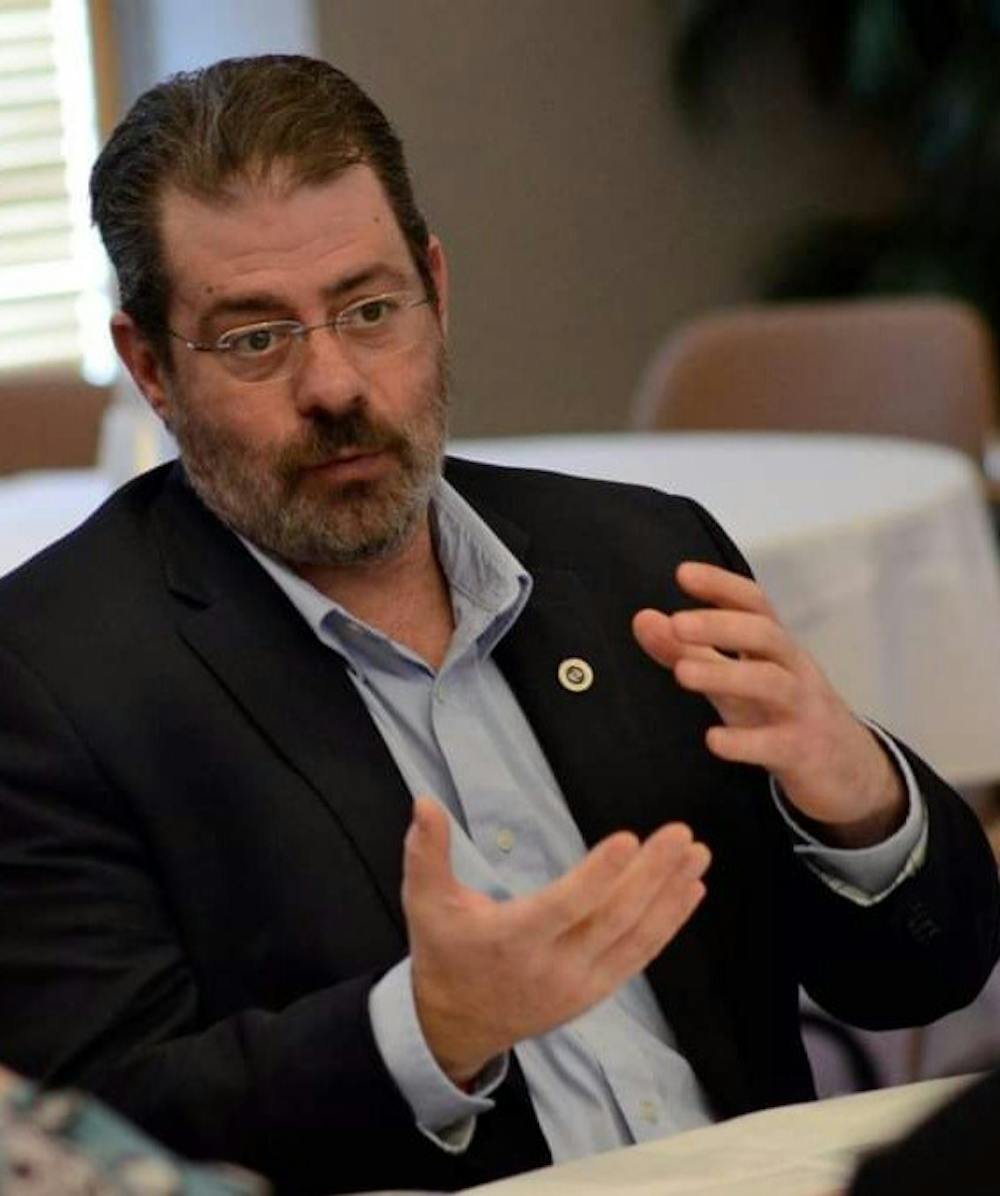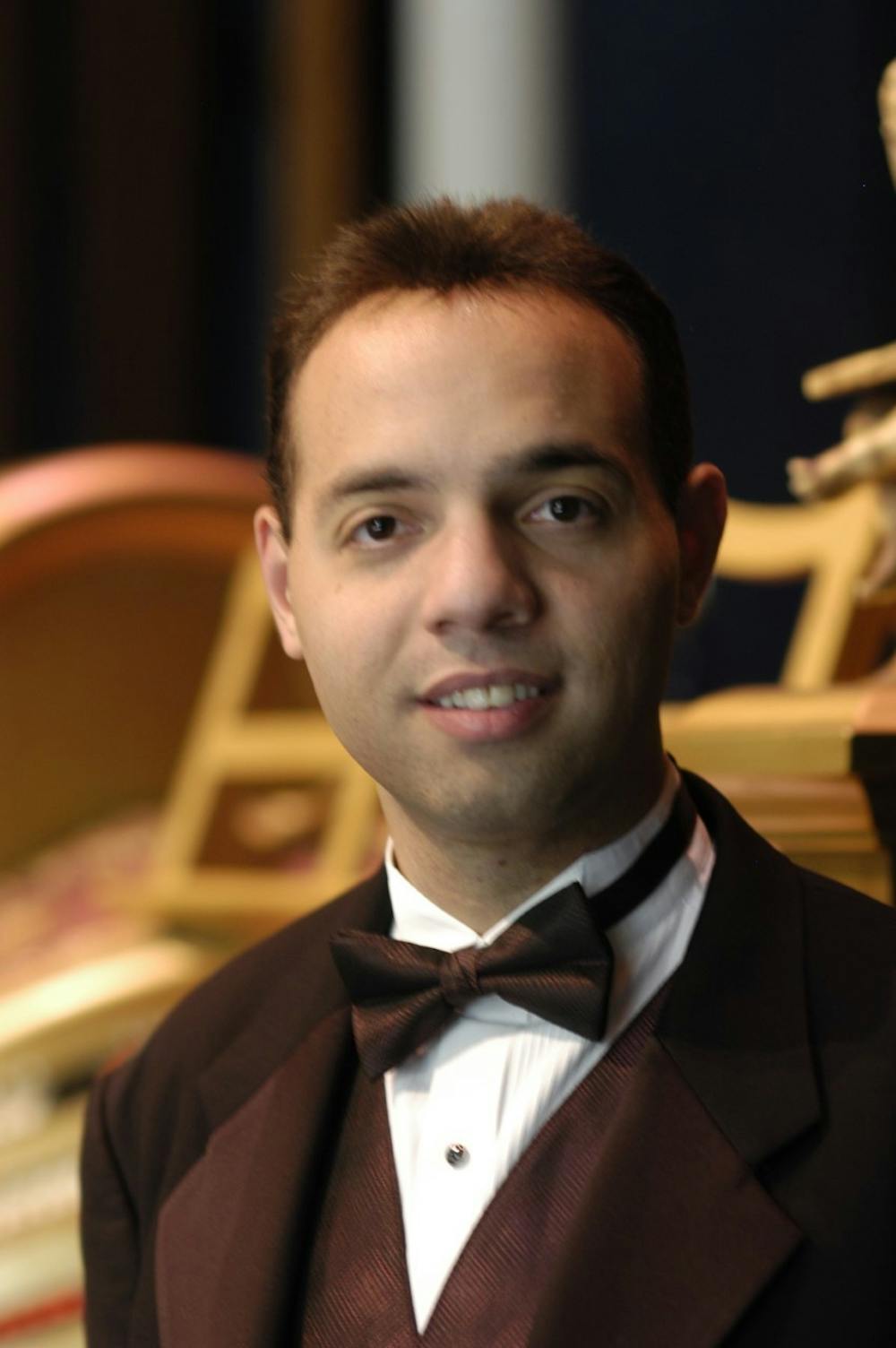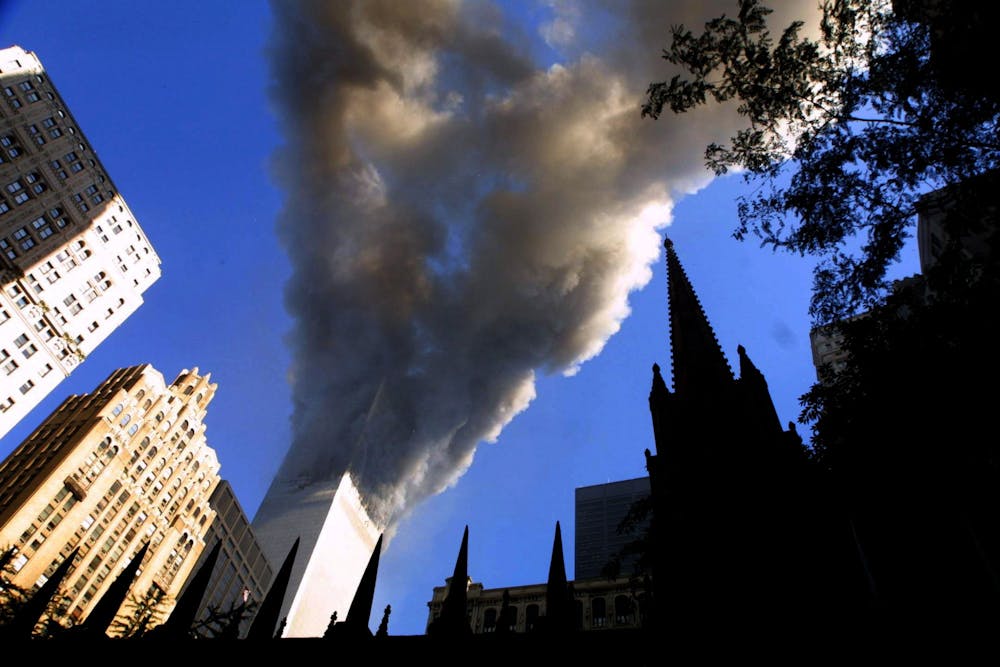“Then, it was real.”
It was Maria Fitch’s 3rd birthday.
Jason Newman, CEO of the Boys and Girls Club of Muncie, was a preschool teacher in the Brooklyn Heights neighborhood at the time. Before the school year started, he paid visits to his students and their families. For Fitch, her visit coincidentally fell on her 3rd birthday — Sept. 11, 2001.
“I got off the subway, and I heard a boom — which, in New York City, you hear all the time — whether it’s a truck backfiring or some work being done in the street, so I didn’t think anything of it,” Newman said. “And I just kept walking over to Maria’s house.”
He made it to Fitch’s house for their 9:30 a.m. appointment and rang the doorbell for 10 minutes until Fitch’s mom answered the door.
“A plane just flew into the World Trade Center,” she said.
Newman said everyone in New York had thought it was an accident at the time, so he went on with his 15-minute appointment with the Fitch family. But, as he was getting ready to leave their home, Fitch’s mother said a second plane had flown into the World Trade Center.
“That was a bit different,” Newman said. “That was more of a ‘Huh, there’s something going on’ moment.”
After leaving the Fitch’s house, Newman went to work at Plymouth Church School, which was located inside Plymouth Church, a historic church in Brooklyn, about five or six blocks away from the World Trade Center. He sat inside with his coworkers and listened to a radio to figure out what was going on, but there were still very few details.
As time went on and more reports came in, Newman said shuttle ferries evacuated people from downtown Manhattan and brought them across the East River into Brooklyn. As people evacuated, Newman and a few of his coworkers handed them water bottles, blankets and towels to do whatever they could to help.
“There were people coming across the river, and you’d see them and it just looked like they had white hair because it was covered in ash,” he said.
Newman said they gave survivors whatever they could to wash themselves off or keep warm. He also said there was a pizza place and a deli on the street handing out free pizza and water. He felt like he couldn’t leave because he wanted to help, but no one knew what was going on — they knew it wasn’t an accident, but didn’t know the full extent of the tragedy.
“I’m trying to — on my cell phone — call my family and just make sure that everybody’s OK, and cell service was just horrendous,” Newman said. “I wasn’t repeatedly calling people because I was doing other things, and I was trying to keep track of what we were doing, so I didn’t actually hear anything from anyone in my family for hours.”

Jason Newman is the CEO of the Muncie Boys and Girls Club, but was in New York City on Sept. 11, 2001. Newman was a preschool teacher in New York at the time. Jason Newman, Photo Courtesy
After helping at the church for a couple of hours, Newman went to his father’s house to try to use the landline phone to call family and watch the news in hopes of getting some answers. However, when he turned on the television, the only station available was one that played a local program named “New York One.”
“They kept showing the planes flying into the towers, which was just incredible to see,” he said. “But, even having interacted with people evacuating from downtown and watching [the attacks] on TV, it still kind of felt like a movie until they started showing footage of people jumping out of the windows — and, then, it was real.”
Newman had been to the top of the World Trade Center prior to the 9/11 attacks and said he “could not imagine the terror that must have been in those people's hearts” to jump.
Newman said he continued to turn off the television every so often and go outside to interact with other people until his father and stepmother came home. The three of them went on a walk to the Promenade, a walkway in Brooklyn that overlooks the Manhattan skyline, but it was packed with people.
Because it was so busy, they went back to his dad’s apartment and looked at the skyline from the roof.
“One of the spookiest things that happened at that point was we walked up to the roof and found what must have been somebody’s little day planner,” Newman said “We found pages on our roof kind of burned and charred up, and the date that landed at my stepmother’s feet was the day my brother was going to be getting married … the date that landed at her feet was the day of his wedding.”
Newman said he remembers walking around the neighborhood that night, talking to whoever he could to get more information about the attacks.
“We all kind of knew people who worked down there, and we were just trying to check in on families that we knew … and just looking for some sort of interaction,” Newman said. “A lot of New Yorkers do not generally talk to strangers, but you would pass somebody and it was, ‘What do you know? Where were you? Do you know anybody who was there?’”
For nearly a year after the attacks, Newman said, it was impossible to walk on the streets without someone asking if they knew anyone killed in the attacks or where they were when it happened.
“You couldn’t walk past any firehouse that didn’t have empty boots lined up in front of pictures of the men and women that lost their lives,” he said. “I didn’t know anybody directly who died, but nobody didn’t know anybody who knew somebody that died.”
Newman said he didn’t have to explain what happened on 9/11 to his students because they were only in preschool, but he would have conversations with parents of his students about the best ways to discuss what happened.
“Everybody was scared, everybody was sad and everybody was nervous, and none of us had words for it … we never really talked about it with the kids, and it never really came up,” he said.
Nearly 20 years later, Newman said he doesn’t spend a lot of time thinking about 9/11 but gets emotional each year on the anniversary when he watches tributes to the victims.
“I think if we had not been through the 2020 we’ve been through, or the 2021 that we’re in now, I think [the 20th anniversary] might hit a lot harder,” he said. “I think, after the last 20 months that we’ve had, it’s a little bit different.”
Newman said he doesn’t know how he will feel on the actual 20th anniversary of the 9/11 attacks, but he will always remember Sept. 11, 2001, was Maria Fitch’s 3rd birthday and that she grew up in a New York City completely different from the one he had known.
A New York Standstill
Jelani Eddington grew up in Muncie and attended Indiana University before moving to New York City to finish law school and began practicing law in 1999. He found out about the attacks when a friend of his from Indiana called and asked if he knew there was a plane that had crashed into the World Trade Center.
“I had not heard yet because I was in the office early — earlier than I normally would have been that morning,” Eddington said. “I think I popped onto CNN.com and saw the first images of the World Trade Center with a hole in the side, and that’s sort of how everything started for me.”
Eddington’s office was in Midtown Manhattan and the World Trade Center was downtown, so he was not close at the time of the attacks, but he did go downtown later that day.
“Shortly after I heard about the attack, I actually jumped on the subway to go to a cafe that was near Christopher Street, where [me and my friends] would typically hang out,” Eddington said. “About halfway there, the subway stopped in the middle of the ride, and they basically said that, due to an ongoing or developing emergency at the World Trade Center, they were going to stop and let everyone out.”
When he left the subway, Eddington was about five blocks away from the World Trade Center.
“Coming out of the subway, you saw everybody motionless,” he said. “Everybody was just standing right where they were, looking up. Taxi cabs had stopped, and their doors were open with the radio turned up so that people could hear, and everything just came to a standstill, which is not something that you ever really see in New York.”
When Eddington looked up at both towers, the north tower, where the plane had already hit, had a “great deal” of fire, smoke and debris coming from it. He had thought there was only one attack and didn’t see the damage to the south tower until people around him began pointing it out.
Like Newman, he had believed the attack was an accident and that a small plane had crashed into the twin towers. It wasn’t until he questioned how two planes could make the same mistake that he realized it was intentional.
“I remember saying, ‘Well, how could there possibly be two airplanes that strike and crash? How is that possible?’ Then, this guy looked at me and he said, ‘Well, you don’t think that it was actually an accident, do you?,’” Eddington said. “And I was like, ‘Oh well, I hadn’t really considered that either.’”
Eddington learned the details of the attacks from the people around him rather than from the news, which he said is different from how most people observed the events. Everything he heard had come from listening to those close to ground zero.
Although he had gotten a lot of information about the attacks from the people around him, not all of it was necessarily true, Eddington said.
“We started to hear, at one point during the morning, that, I think, Camp David had been attacked or there was a bomb at the State Department,” he said. “There were just all kinds of other things that were happening that were just kind of like a big game of telephone.”

Jelani Eddington may live in Wisconsin now, but was in Manhattan on 9/11. Eddington watched the north tower fall on Sept. 11, 2001. Jelani Eddington, Photo Provided
Eddington was at ground zero for about 20-25 minutes that day, he said, but it seemed a lot longer than it actually was. One of his most vivid memories from that day, he said, is from when he had been standing at ground zero for about 10-15 minutes.
“There was what looked like a wall of people running away from the Trade Center north [tower] toward my position where I was standing,” Eddington said. “And, at about that same time, the law enforcement on the street started shouting at us that we need to leave, we needed to run.”
Law enforcement had gotten reports about a third plane in the air — which Eddington assumes is the one that crashed at the Pentagon — and was told it was coming to New York, so everyone in that area needed to run and get away.
“That’s a very vivid memory that I have just because it was one of those times in your life where you actually think that you might be in mortal danger right there in that moment,” Eddington said. “I think it’s the only time in my life that I felt like I was at risk of dying imminently, and that is a feeling that is unlike anything else.”
Eddington ran for about five minutes until he felt he was far enough away that he could walk. He tried to find a subway or bus to take back to his office in Midtown, but nothing was running at the time, so he started to walk uptown. But, nearly half an hour later, he said the streets turned into pandemonium.
He had not thought about the building collapsing, so he was shocked when the people around him had told him one of the twin towers had fallen.
“I looked back again, and there was just one tower, whereas, obviously, there had always been two before,” Eddington said. “I remember thinking, ‘Wow.’ When that happens, it’s very difficult to process what somebody has told you has happened, and now, when you look, there is only one tower standing and a lot of smoke.”
He continued to walk uptown to his office when, 30 minutes later, he stopped to talk to someone on the road and watched the second tower fall.
“I do vividly remember seeing the building come down, which would have been the north tower,” Eddington said. “By then, you knew what had happened with the south tower, so in a sense, it was a little less shocking, but you can’t quite process what it is that you’re seeing.”
In that moment, Eddington said, he wasn’t thinking about the thousands of people who were in the building because he believed it was still early enough for there not to be many people. But when he got back to his office, he learned more about the attacks and saw footage of them playing on the screens in Times Square.
“When you see that for the first time, it’s just so jarring and so shocking,” he said. “From that point, it started to, I guess, sort of slowly sink in a little at a time. It took a while to process just what had happened.”
Eddington said he went back to lower Manhattan after it had been shut down and reopened after the attacks. He said he remembers how eerie it was because two or three inches of dust settled on every surface in the area.
“You saw vending trucks that still had their bagels and drinks in them, and they were all covered with dust, and you saw storefronts where the windows were blown out, and they all had mannequins in them with the clothing on, covered in dust,” Eddington said. “It was unlike anything I’ve ever experienced.”
Eddington remembers, for months after the attacks, posters of missing people lined the city, and everyone was too scared to take them down and acknowledge their loved ones were really gone. Every subway stop he went to, he said, was lined with the faces of lost loved ones.
On 9/11, Eddington said, all the subways were done for the night, and he was ready to sleep in his office, but someone had told him the ferry service was running late and bringing people across the Hudson River into New Jersey, where he lived at the time.
“I went down there and there were — I couldn’t even estimate — 30-40,000 people trying to get on ferries to get off the island to go across to New Jersey,” he said.
Eddington said they were all standing shoulder-to-shoulder on the ferry, trying to fit as many people on as possible, and the boat made its way into New Jersey, passing what remained of the World Trade Center.
“For my entire life, I had always seen the World Trade Center down there, and, now, it’s just not there,” he said. “Instead, there’s just this billowing plume of black smoke, and you just look at that and cannot comprehend that is what’s happened. And on that boat with all those people, it was absolutely silent. Nobody was talking — everybody was just looking at that and was silent.”
For Eddington, he said it doesn’t seem like it’s been 20 years until he realizes there’s a whole generation of people who have grown up after 9/11, which he realized most when he visited the memorial shortly after it opened in 2011.
“It’s one of those key, defining moments in time that you’ll always remember,” he said. “A lot of stuff happened as a result of 9/11, and it all goes back to that day … it had a huge, huge, huge impact on virtually every aspect of life.”
Contact Maya Wilkins with comments at mrwilkins@bsu.edu or on Twitter @mayawilkinss.





